Woman Gives Dog To Her Sister Due To Her Abusive Partner, Now She Wants The Dog Back After 4 Years Of Him Bonding With Her Sister's Family
Dogs are incredible creatures. If you did a quick search on them, you’d find that this is true for multiple reasons. They are the cuddliest companions you could ever ask for, and they offer numerous health benefits, such as reducing stress and improving heart rates.
Unfortunately, not everyone is a dog lover. Are they missing out on a lot? Quite frankly, yes. However, you can’t blame them. There are many reasons why people don’t like dogs.
For some, it’s the responsibility of owning a dog, as dogs require attention and financial resources. For others, they can’t stand dogs due to allergies, and for some, it’s simply because they are cat lovers and have no space for another pet in their lives.
In our opinion, there’s no such thing as too many pets! We found a story on the AITA subreddit about a woman who gave her dog away because her abusive partner didn’t want it around.
However, that’s not what this story is really about. It’s more about what happened four years after she gave her dog to her sister.
Four years after giving her dog away, she requested it back from her sister, who refused to return it. Scroll down to read the full story, as shared by her sister.
Details of the story

Apparently, OP's sister's partner isn't a dog lover, which forced her to give Ribbon away. Now she's back for the dog after 4 whole years.

OP isn't about to give Ribbon away without a fight.
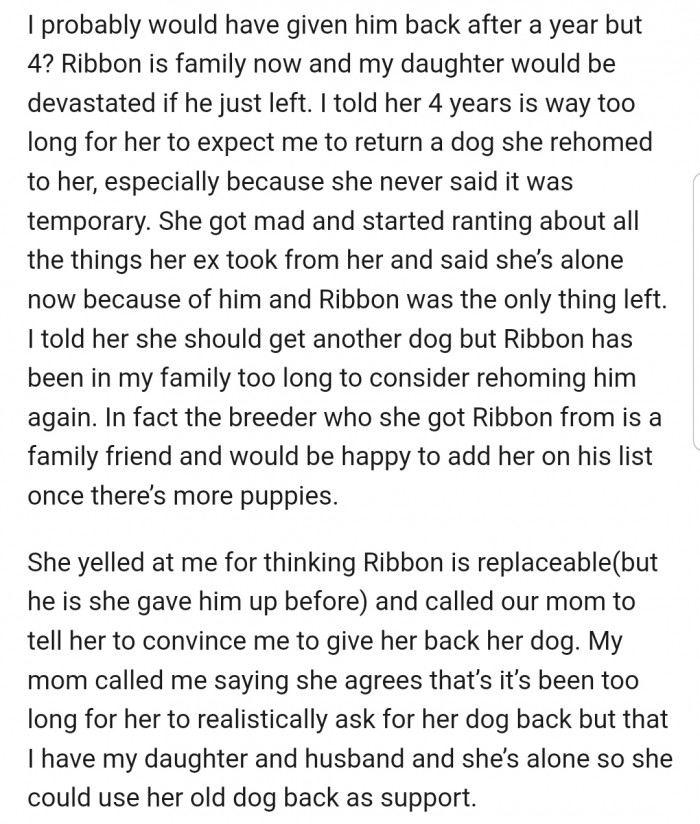
Understanding Attachment and Bonding in Pets
The emotional bonds formed between pets and their owners are profound and can influence the well-being of both parties.
Dr. Sarah Johnson, a psychologist specializing in animal behavior, notes that pets often become a source of emotional support for their owners.
Research indicates that when pets are rehomed, as seen in this situation, it can lead to feelings of loss and grief for both the animal and the previous owner.
Understanding Attachment and Loss
The desire to reclaim a pet after years of separation often stems from deep emotional bonds formed during the early stages of ownership. Research in attachment theory suggests that pets can serve as significant sources of emotional support, especially during challenging times.
According to studies published in the Journal of Social and Personal Relationships, the bond between a human and their pet can mirror that of human relationships, making the loss or separation profoundly impactful.
Here's how the Reddit community reacted to the story:
"She wants the dog back after four years? LMAO. She's out of her mind."

"If she wants something that she can give away and take back on the whims of whoever she's dating, she can get a stuffed animal."

"She should look into adopting another pet. She voluntarily let Ribbon go, but you aren't, and it's not up to her."
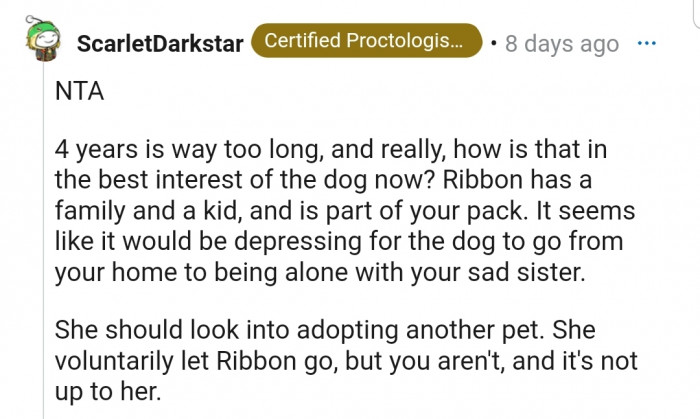
This case also raises important questions about the nature of attachment and the potential for emotional distress when a pet is separated from its owner.
Studies show that pets can experience separation anxiety, which can manifest in destructive behaviors or changes in temperament.
Understanding these dynamics is crucial for anyone considering rehoming a pet, as it impacts both the animal and the human involved.
When individuals experience loss, whether human or animal, the grieving process can manifest in various ways. Psychologists indicate that feelings of attachment and loss are closely linked to our emotional well-being. Understanding the stages of grief—denial, anger, bargaining, depression, and acceptance—can provide insights into the emotional turmoil faced by the individual in this situation.
Recognizing these stages can help facilitate healthier conversations about the pet's future.
"This is not a stuffed animal that you can pass back and forth."
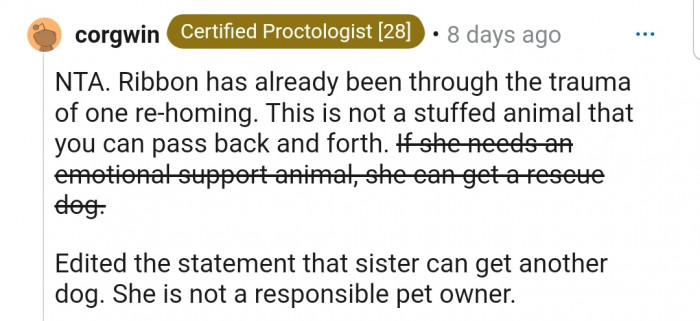
"NTA - you've given Ribbon a loving home for four years. Once she decided to marry her ex, she effectively made giving Ribbon away a permanent decision."

"NTA. Your sister chose an abusive boyfriend, then husband, over her dog."

Navigating the Rehoming Process
When considering rehoming a pet, it's vital to approach the situation with compassion and care.
Experts recommend involving the pet in the decision-making process by observing their comfort levels and behaviors in different environments.
This approach can help ensure that the new home is a good fit for both the pet and the new owners, minimizing emotional distress.
The Impact of Long-Term Separation
Long-term separation from a pet can lead to complex emotions, including guilt, regret, and longing. Research suggests that unresolved grief can lead to relational difficulties, particularly in future attachments. Studies indicate that individuals may project their unresolved feelings onto new relationships or pets.
In this case, understanding the emotional implications of the past decision can be significant for both the owner and the sister caring for the dog.
"If she is serious, then she should reimburse you for all food, vet bills, and medications for the last four years. Plus a boarding fee."
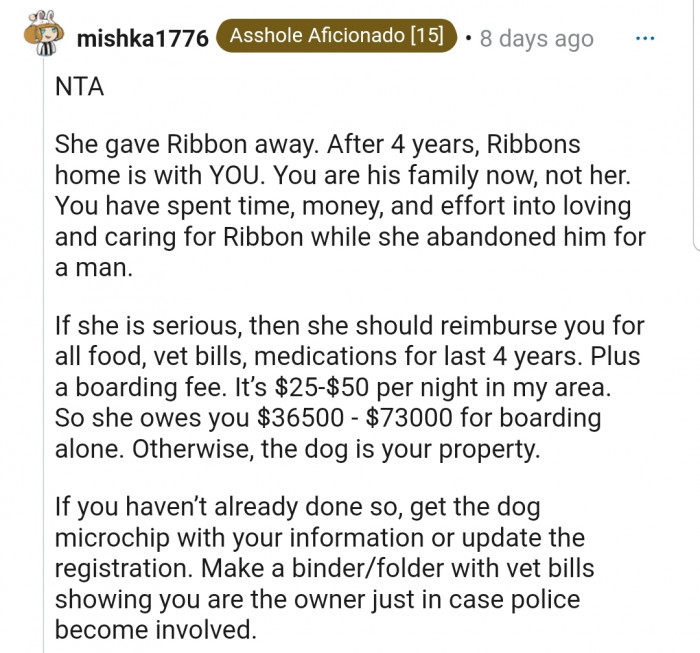
"Your sister can get another dog, and you guys can have puppy dates so that Ribbon is still part of her life."

"You raised the dog, you spent money on the vet bills, food, toys, grooming, and presumably the dog is chipped and in your name. He's your dog."
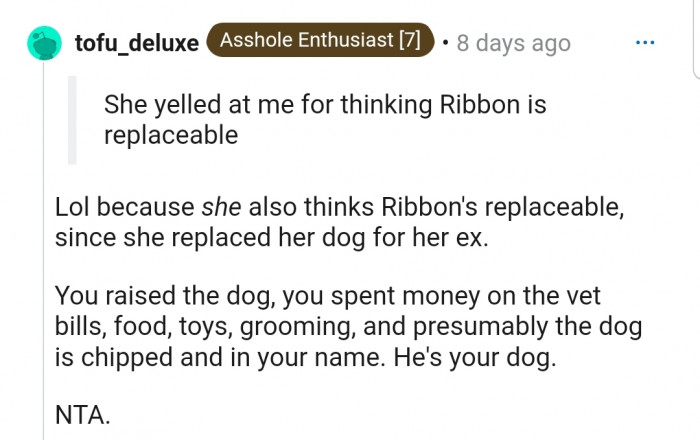
The emotional turmoil experienced during the process of reclaiming a pet should not be underestimated.
Coping strategies such as journaling or seeking support from friends or professionals can be beneficial for individuals grappling with these feelings.
Research indicates that processing emotions can lead to better outcomes and facilitate healing during transitions.
To navigate the complexities of reclaiming a pet, it may be beneficial to engage in family discussions that prioritize empathy and understanding. Utilizing a mediator or therapist can help facilitate these difficult conversations and ensure that each person's feelings are validated.
Moreover, developing a plan that considers the dog's well-being—whether through shared custody or gradual transition—can significantly impact the emotional health of all parties involved.
"What happens when her next relationship isn't conducive to keeping Ribbon a permanent part of her family?"

"How quickly would she kick the dog to the curb again if her next boyfriend doesn't like dogs?"

"Maybe this is judgmental on my part, but if any guy told me I had to get rid of my dog before we move in together, it would be game over for us."
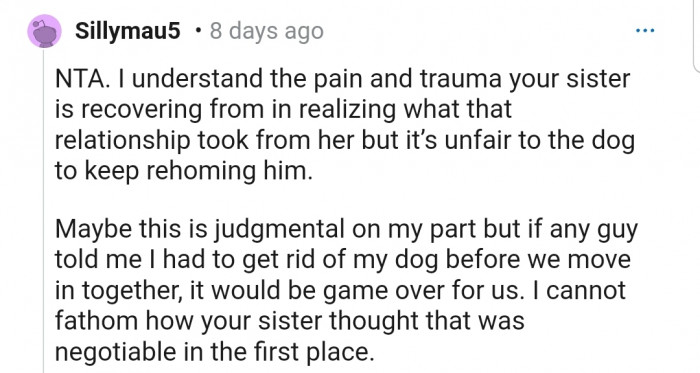
The Importance of Open Communication in Pet Custody Issues
Communication is essential when navigating disputes over pet custody, as in this case.
Experts suggest that both parties engage in honest discussions about their feelings and the pet's needs to reach a resolution that honors the bond between the pet and its caregivers.
This collaborative approach can ease tension and lead to a more amicable outcome for everyone involved.
Rebuilding Connections After Separation
Re-establishing a bond with a pet after years apart requires patience and understanding. Research indicates that the process of reconnecting can evoke both joy and anxiety, as individuals navigate the changes in their relationship with the pet.
It's important to approach this situation with a focus on the pet's needs, ensuring that any transitions are gradual and considerate of the dog's established routines with the sister's family.
"If I had to temporarily give up one of my cats, I'd have come to visit them every chance I got."

When you’re too adorable, it’s normal to have two people fighting over you. That’s why we understand why OP and her sister are unwilling to let go of the dog.
However, the commenters all agree that OP is NTA, as Ribbon is now fully settled in a loving and caring home.
Some argued on behalf of the dog, stating that it would be confusing for it to be rehomed once again after getting used to its new family.
Do you think OP is the A-hole for refusing to return the dog? Let us know in the comments below!
Psychological Analysis
This scenario highlights the profound emotional connections we have with our pets and how these connections can shape our relationships with others. The longing to reclaim a pet reflects a deep-seated need for connection and belonging, which is fundamental to our emotional well-being. Addressing these feelings with empathy is crucial for finding a resolution that respects everyone's emotional investment.
Analysis generated by AI
Analysis & Alternative Approaches
Ultimately, the emotional complexities surrounding pet ownership can lead to challenging decisions and feelings of loss. Understanding attachment theory and the grieving process can provide valuable insights for families navigating these situations.
By prioritizing open communication and empathy, families can work toward solutions that honor the emotional needs of each individual, including the pet.
Analysis & Alternative Approaches
This case illustrates the complexities of pet ownership and the emotional ramifications of rehoming.
Understanding the psychological aspects of attachment can significantly inform how individuals approach these sensitive situations.



